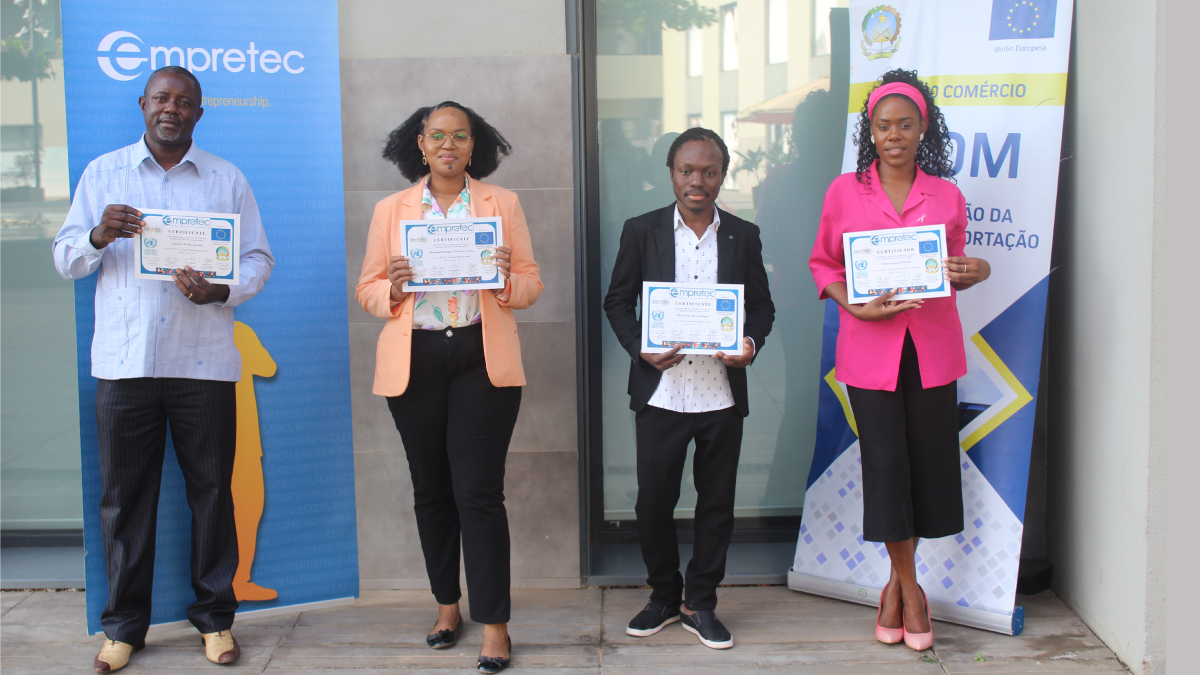A national trainer programme is increasing the local ownership and sustainability of an EU-funded UNCTAD project in the southern African nation.
Geraldo Basilua, Rosenayde Gomes, Wilson Kitth and Tunísia Sebastião (left to right) have been certified as national trainers for UNCTAD's Empretec entrepreneurship programme.
Sustainability and local ownership are two key challenges facing international development projects. Often, when a project ends and the implementing institution leaves, activities on the ground wind down, too.
To prevent this from happening when the EU-UNCTAD Joint Programme for Angola: Train for Trade II comes to a close, the UN trade and development body has put in place, among various sustainability measures, a national trainer programme as part of its entrepreneurship training activities in the Southern African nation.
Between 2018 and 2021, UNCTAD trained close to 360 Angolan entrepreneurs through its reputed Empretec programme, thanks to funding from the European Union.
“Early indications from the ongoing impact evaluation have shown highly positive immediate results from the trainings,” said Lorenzo Tosini from UNCTAD’s Empretec programme.
“Local entrepreneurs have been able to increase their turnover and profits, create new jobs, expand to other sectors and take better advantage of entrepreneurial opportunities in Angola,” he said.
Keeping the rhythm
To maintain the Train for Trade II programme’s successful rhythm and sustainably grow the Angolan entrepreneurial base, UNCTAD has trained and certified four Angolans as national Empretec trainers, two of whom have become master trainers.
They will pass their skills on to other programme graduates through training-of-trainers activities to grow the pool of national trainers. The goal is to boost local training capacity to ensure a broader and more sustainable impact from the programme.
Amadeu Leitão Nunes, Angola’s secretary of state for commerce, said: “With the development of a critical mass of national trainers, able to deliver trainings to entrepreneurs in different sectors of the economy and the development of a network of empretecos – as those who successfully conclude the course are referred to – we believe that the necessary conditions are in place for Angola to enter a new stage in the Angolan business landscape.”
Jeannette Seppen, the EU’s ambassador to Angola, said: “Angola is so much more than just oil. The country has a plenitude of natural resources, innovative, creative and hard-working people, and an ideal location.”
“Having more entrepreneurs with the right skills and vision to move a diversified, sustainable economy forward is crucial for Angola,” she said, “and the EU wants to support this process through its partnership with UNCTAD and the Angolan government.”
Passing the torch
The national Empretec trainers already trained four Empretec groups of entrepreneurs (more than 90 Angolan businesspeople) early this year.
“The feedback from the trainees, who reported a 100% satisfaction rate, shows that the quality of Empretec trainings after the handover to national trainers entirely meets the expected standards,” Mr. Tosini said.
The four trainers, Geraldo Basilua, Rosenayde Gomes, Tunísia Sebastião and Wilson Kitth, want to carry the torch further and grow the pool of skilful entrepreneurs in Angola.
“Empretec changed my life”, said Geraldo Basilua, one of the two certified master trainers. “Now I want to give back and train more entrepreneurs. I want to help transform the Angolan economy.”
The other master trainer, Tunísia Sebastião, is also a leading figure in promoting women’s entrepreneurship in Angola.
“Women’s economic empowerment and their inclusion in society has to become everybody’s commitment,” she said.
Rosenayde Gomes feels that being an Empretec trainer provides the possibility to help other would-be entrepreneurs reach their full potential.
“It is highly rewarding to be able to pass the power of transformation to people, to take them from point A to point B,” Ms. Gomes said.
Mr. Kitth agreed: “Empretec changes one’s perception of business and life. It is revolutionary in many ways. I hope government authorities come to appreciate it as a real ally in the revitalization of the national economy.”
Seizing the wheel
The national Empretec host institution, Prestígio – Liga de Jovens Empresários e Executivos de Angola, earlier this year signed an agreement with UNCTAD to coordinate the delivery of future Empretec training sessions in Angola.
UNCTAD has worked closely with the institution to improve its capacity to manage the Empretec programme nationally, preparing it to seize the steering wheel in November 2021 with its government partner, INAPEM, which supports micro, small and medium-sized enterprises.
Prestígio’s director, Hirondino Gonçalves Garcia, and INAPEM’s chairman of the board of directors, Arnito José Agostinho, emphasized the need to continue responding to market needs and to provide high-quality entrepreneurship training also in remote areas.
“In this sense, our collaboration with INAPEM and other interested partners is crucial,” Mr. Garcia said. “INAPEM offers its local infrastructure in different provinces as training rooms, which for us is a basic condition for training delivery.”
Mr. Garcia added that his institution is working with funding partners to provide aspiring entrepreneurs all over Angola with the financing they need to pay for the training.
In the coming months, UNCTAD will continue to support national institutions as they deliver Empretec trainings, providing mentoring and guidance to ensure objectives such as a balanced participation of women are achieved.
And to help ensure a conducive legal and policy framework for entrepreneurship in the country, the organization is supporting INAPEM as the institution develops a national entrepreneurship strategy with a broad range of stakeholders.
UNCTAD’s approach to promoting sustainability and local ownership of its entrepreneurship training activities in Angola helped the Train For Trade II programme earn recognition from the UN Department of Economic and Social Affairs as a global Sustainable Development Goal good practice.

